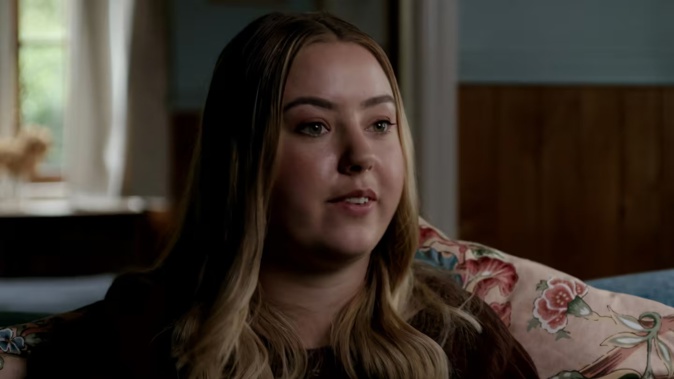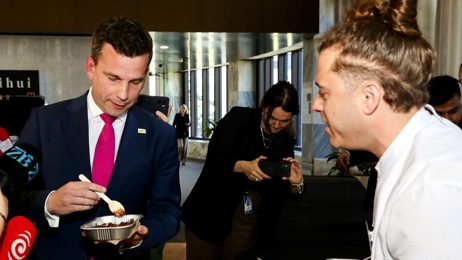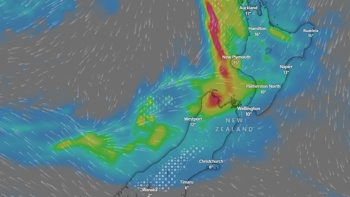
What’s it like to leave Gloriavale? A new TVNZ documentary, Escaping Utopia, seeks to answer that question and one former member, Theophila Pratt, tells the Herald what her exit was really like.
“You were trying to save yourself all the time,” Theophila Pratt says of her years growing up in Gloriavale, which she left in 2016.
Now, with her involvement in TVNZ’s new documentary Escaping Utopia, a three-part investigation that documents the stories of Kiwis who’ve fled Gloriavale, she hopes it might provide salvation for others.
“Natalie and Justin have been really good to work with,” Pratt says of directors Natalie Malcon and Justin Pemberton, and it’s been one of her best experiences with the media.
And it’s far from the first time the religious cult has been in the public spotlight, as Kiwis have continuously shown a fascination with the insular Greymouth community.
Even now that she’s left, Pratt admits she struggles with the attention around the group ... that sense of voyeurism and stereotyping.
“It can easily take you back to feeling like you’re in Gloriavale,” she explains. “That feeling of being an animal in the zoo.” It can strip away your selfhood. “Each of us have our own different experience and story from growing up in Gloriavale.”
The Gloriavale Christian Community. Photo / George Heard
From the media publishing stories and moving on with the news cycle to people making comments, it’s not easy being part of the story, Pratt says.
“We’re left with the consequences of being in the public eye,” she says.
- Man sentenced to 11 years jail for sexual offending against Gloriavale children
- Gloriavale members seeking compensation believed to be in the millions
- Gloriavale Leavers Support Trust manager believes others will join group claim for compensation
- Escaping Gloriavale: A mother's tale of growing up in the sect
Now based in Auckland, Pratt grew up in Gloriavale in Greymouth — it was her whole world.
“You know that there’s something else out there, but you don’t know what that is, and your only view of that is from Greymouth,” she says. “I often remember looking past the mountains and wondering what else was out there.”
Pratt says residents lived in fear of God coming back, not knowing whether they’d be sent to heaven, which she believes is how the leaders maintained control.
“You grow up being terrified of hell, but you’re pretty much living in hell,” she says.
“You were told you were in control of your own salvation. If you took the bread or wine for communion on Sunday night, and you hadn’t been forgiven of your sins, you could die in your sleep that night.”
She says even small children would go to bed afraid that they wouldn’t wake up.
The fear and anxiety around salvation and damnation were constant.
“You were trying to save yourself all the time.”

Theophila Pratt grew up in the restrictive community of Gloriavale on New Zealand's West Coast.
Pratt started to question the status quo at around 10 years old, she says. “I pretty much knew something was not right.”
Pratt knew she wasn’t going to live there forever, but she also understood the implications of leaving.
“You know once you step out that gate you’re going to be cut off from your family.”
Seeing other people leave, or commit minor transgressions and how they were treated afterwards, helped her find clarity with her perspective.
“It was that flipping of how people got treated.” She realised things weren’t adding up.
The gender dynamics were part of that.
“Growing up in a family where my father was abusive to my mother, and watching no adults do anything,” she says, was hard.
Abuse wasn’t kept hidden, “but it wasn’t seen as bad. It was normalised, and it’s the wife’s fault,” Pratt adds. “Everything was my mum’s fault.”
Pratt believes men were oblivious to the way they treated women. “It doesn’t even cross their mind. And most of the time they don’t even realise girls are being treated badly.”
That lack of care for women is what she grew up seeing, and Pratt understood that would be her life too.
“In general, women were always against each other,” she says. “They’re driven apart.”
There’s competition, especially in terms of fertility and social surveillance — to help people look better in the leaders’ eyes — alongside the hypocrisy of gossip being deeply frowned upon.
Staying in that environment and facing a future of continuous childbearing, domestic labour and potential damnation? “I’m not going to let that happen to me,” she decided.

Gloriavale is a small, isolated community. Photo / George Heard
And it was Gloriavale’s commitment contract that was a breaking point for Pratt. “They make it out that it’s a legal document, even though it’s not,” she explains.
Around the ages of 16-18, young people will go to the leaders and agree to officially devote themselves to the community, and can then get married. “They have to stand up in front of everyone at the Sunday meeting and make their commitment.” It binds them to the church. “They’re pretty much signing their life over.”
Pratt could see her future: getting married and having hoards of kids. “In Gloriavale that’s what girls live for, but that’s what I dreaded.”
“I didn’t want to sign the commitment,” she explains. “I said something, and the wrong person heard, and it all just blew up.” This happened on a Friday, when Pratt says they wanted her to sign the commitment on the Sunday, “to prove that I was going to submit to the leaders, and I was going to change”.
Instead, Pratt asked if she could be “put out” of Gloriavale; that Sunday she told them she wouldn’t be signing the contract.
What unfolded next was swift.
“I had to go to my room, pack all my stuff. The next morning I was dropped off at the bus stop in Greymouth, and they’d booked me flights to Auckland. And that was that.”
Did her family say goodbye? “My brother and my mum dropped me off,” Pratt says. “They said ‘Your decision to leave the church has damned your soul for eternity’.” Her brother said his children would never hear her name again. “And then the bus was there.”
Her head was spinning. “Five hours on the bus was not fun.”
Pratt made it to Christchurch. This was her first time at an airport, ever; a stranger helped her with her heavy old suitcase, and the helpdesk showed her the way.
“When I left I didn’t know where Auckland was.” All Pratt knew was that her mum grew up there.
She didn’t have a phone. But she did have a business card.
It belonged to an old school friend of her mother, an Aucklander who had visited Gloriavale once. Pratt had kept it for four years. They picked her up from the terminal. “I can’t go back,” she told them.
Being in Auckland was exciting, and stressful. She went to the Pak’nSave at Sylvia Park and thought “where am I and what is this place?”
And what about all those sinners, the outsiders they were taught to fear? Interacting with people outside Gloriavale was mindblowing. “They had empathy,” Pratt says. “I’d never experienced someone caring for me and actually, genuinely asking ‘How are you?’”
It helped her question other things about what they’d been taught in Gloriavale. Pratt started researching, reading all she could online about the community.

Gloriavale is located at Haupiri on the West Coast of the South Island. Photo / Kurt Bayer
That’s when Pratt realised she wasn’t wrong, and she wasn’t alone. “I thought, this all adds up,” she says. “You start realising how many lies you were told.”
The first couple of years were a blur, Pratt says. “My brain was just taking so much information on.” She found a job, which wasn’t easy, and then started studying at university, also challenging. “But it was the best feeling ever.” In Gloriavale they’d leave school at 16.
“As a woman, you’re not set up to be an individual,” Pratt says. “So, when you’re out here trying to get a job and have a life, you don’t have that skill set. You can cook and clean but you don’t have that confidence within yourself of who you are.”
Surprisingly, given the conditions she left under, there were visits back to Gloriavale. For the first, Pratt snuck in, hidden away in vehicle, and wandered around. “Then people saw me, and took me to the office to the leaders.” Pratt was told to leave and they threatened to call the police, but she called their bluff. “All of a sudden they changed their tune.”
She saw her family, although, painfully, her sister covered her nephew’s eyes. “The first visit didn’t go well at all.” Pratt took months to recover.
But she kept going back, another four or five times. “You go in there with the hope that you might see some of your family.”

As a child, this tractor was Pratt's favourite, but girls in Gloriavale were not allowed to play with "boys' toys".
She also wanted to show people she was doing well and, Pratt hoped, inspire them to do the same. Some members would ask about her life. “I was determined to show people in Gloriavale that we weren’t these bad, evil people,” she says. “People would try and convince you to come back.”
A later visit with her partner was a different experience, they were even served lunch. “They made it out to be the best place ever,” Pratt says. “It was the weirdest thing”.
Always, though, she was struck by how tired and depressed the women all looked. “I thought, oh my gosh I looked like that. You felt like it, but you didn’t know you looked like it.”
She knows she made the right decision to leave, and moving to Auckland was the best thing for her.
Initially open about her background, she’s learned to be more private, protecting herself. Saying no and having boundaries was something she had to learn. “It’s not something I was used to.”
But Pratt is determined and ready to share her experience. “So much wrong has been done and so much hurt has happened,” she says. “Emotionally it’s been good to get the story out.”
With this new documentary, she hopes to show people the truth about Gloriavale and open the eyes of those still in the community. “The more of us that tell our story the more other people in there and have left will think, it wasn’t just me.
She also has more to tell, and has been working on a book since 2018. “You get to the point where you want to tell it yourself. There’s a publisher lined up and it will likely come out later this year.
Until then, Escaping Utopia will share Pratt’s experiences and those of other subjects with New Zealanders, shining a light on the practices at Gloriavale.
Escaping Utopia premieres Sunday, March 24, on TVNZ 1 and TVNZ+.
Emma Gleason is the New Zealand Herald’s lifestyle and entertainment deputy editor. Based in Auckland, she covers culture, media and more.
Take your Radio, Podcasts and Music with you









